The next day, our training began. The parties from Veliko, Tsura, and Akassiya had all arrived before us, which caused further worry for Semchik, but Khorizova was further away than any of those places, even Akassiya.
Ratty was looking more pompous than ever that day, pleased as a peacock, probably considering the previous evening a great victory for him. It was just as well. He seemed like a person who needed to seize whatever small pleasures he could in life.
A tall, bright-faced woman was training us, and I was surprised to learn she was Yelena Artyomovich, Aleksandr Artyomovich’s sister. I had heard of her from my cousin Dasha, who praised her martial talents highly. Dasha had come back from Gorakino just months before Semchik and I left, meaner and tougher than ever, and Aksana was bursting with pride, but only when Dasha wasn’t looking.
Yelena brought all of us newcomers to an arena, on the side of which was piled a small mountain of dead goats, one for each of the thirty or so young lords and ladies who had come from across the five oblasts to enter Gorakino’s crucible and come out the other side forged into fully trained volshebniks.
“One a piece,” Yelena told us cheerfully, breath collecting in a sparkling cloud. Her assistant, Mariya Artyomovich, stood behind her, eyes glued to her profile like she was memorizing every word that came from Yelena’s mouth. “Let’s see how well you know your Tajna.”
The goats radiated with dead energy I could feel even across the arena. When I got my hands on one, it was still warm under a layer of hoarfrost beginning to accumulate in its fur. Slaughtered this morning, just for us.
“This myortva must last you,” Yelena shouted above the chattering crowd. “If you cannot control it properly, we do not have thousands of goats just waiting around to be slaughtered. And I hope you enjoy goat meat, because that is all you’ll be eating.”
I bent close to my goat’s coat and closed my eyes. I dug my fingers into its hide and drew out its myortva, the feeling like liquor up my veins, cold and hot at once until it pooled in my chest, flared, and then calmed, settling unobtrusively behind my ribcage.
Mariya ushered in servants, who took the goats’ empty corpses away to be hung and butchered, smoked or dried or taken fresh to the kitchens to be cooked today. What an end to come to, when just yesterday they’d been climbing stumps and butting heads and staring with those calculating rectangle eyes. In Khorizova, I rarely needed anything bigger than a salmon. Fishes seemed easier. Less like us.
That day, and many others that followed, we ran fast as the wind through those spiny Gorakino trees, ran our swords through sacks stuffed with straw, dove our fists through solid wood planks, jumped and did not come down for seconds long enough it felt like flying. We sent out myortva as violence only once, only to ensure that we could, on another unfortunate group of goats. This time, the servants herded them into the arena still living. Trotting, bleating, chewing errant mouthfuls. They left the same as the others had, after we harvested their myortva, too.
Aleksandr Artyomovich, I noticed at once, did not participate. He had already been doing this a year, I learned, and he did not need the practice.
In our days training, I got a chance to observe what I stubbornly (given the secondary purpose of our mission here, which was to foster a spirit of camaraderie and cooperation between those who would eventually become the rulers of the five oblasts) considered the competition. Nikolaj Ivanovich and Sofya Ivanovich Ozero, the twins from wealthy Tsura, were talented enough, but using myortva themselves seemed to be their last priority. Chabas Lvovich of Akassiya was nervous but dogged, no effort too great for her. Ratty was like a terrier, moving in violent bursts—fast and decisive, but graceless. Not that I had ever terribly prized grace, having very little of it myself. It pained me to admit that I was much like Ratty when it came to using myortva, though I liked to think I was better at conserving it (on scant evidence, but still, I liked to think it). Semchik was strong, bless him, having grown almost six inches over the past year, and thoughtful, but almost as wishy-washy as he was in conversation. I was glad we were going on our hunts in pairs. Perhaps he was capable, but I still felt he needed me. I’d feel better after I saw how he did on the first hunt.
Aleksandr Artyomovich, on the other hand, was something of a quandary to me. He never moved more than he had to, but when he did, it was like you could have your eyes on him one moment, then lose him entirely the next, only for him to turn up again somewhere totally different. When you did catch him moving, he seemed languid, almost slow, lazy. You might even think he was concerned about not disturbing that perfect braided hair. But Yelena and Mariya were not shy about yelling at those of us who were slacking off—a common occurrence among our spoiled group of knyazes’ children, grandchildren, nieces, and nephews. More than once Mariya had slapped me across the back of the head for being late or distracted or wasting myortva, and I knew Yelena did not play favorites with the Artyomovich children because I’d seen Ratty get the same treatment. But only once did I catch Yelena chastising Aleksandr Artyomovich, and then I couldn’t hear what it was about, though I desperately tried.
Sofya and Nikolaj said that he was too good to practice with us, and they did not mean it as a compliment. Chabas Lvovich thought that he might be mute, and while I stopped to consider whether I had ever heard him speak, one of the minor Aksanevich cousins said, “He can talk. I heard him say ‘no’ once.”
***
The night before we were to go out to the borders and hunt the ghosts, I couldn’t sleep. I was too excited. And too curious. We’d be away from Watchman’s Palace for a week, and I still knew so little about it. If I got in trouble now, I reasoned, it would give the Okhotnikovs time to forgive me while I was gone.
This would only worry Semchik, so I waited until he was asleep, until as many people as could be asleep in the barracks were (darling Semchik slept easily, bless him). Then I slipped out, whispering, “latrine,” to Chabas because her eyes were open when I passed her bunk. She did not respond, and I was distracted wondering whether she slept with her eyes open and whether she could teach me how to do it until I found myself outside the library.
The palace—fortress, compound—was silent in the middle of the night, but torches still burned in their brackets outside the doors.
The library had not been my particular goal, but I did spend some time in the library at Whitecap Palace. My mother taught me to read from a few beat-up tomes of herbology and storybooks I later concluded she must have gotten from my father (who had taught her to read in the first place was a question I did not even know to ask back then). She read to me to calm me down, to calm both of us down, and when I came to Whitecap, the library reminded me of home. It was one of the few places I could be alone, and nothing reminded me of home more than being alone.
I was the farthest from home—either home—I’d ever been. The doors were locked. If they hadn’t been, I might have just poked my head inside and walked away. Instead, I dropped down and peered into the keyhole. This was a little trick I’d been working on back at Whitecap. It required a lot of control, which, as I believe I’ve already stated, was not my strong suit, but it was a dead useful trick if you could get it right, and it barely wasted any myortva at all. I pressed myortva forward like a little puff of air, the tiniest punch on the tumblers, and I heard them turn. Success, and a little rush, just about the same size as that puff of air but enough to make me smile and stifle a laugh.
Inside, the library was dark, so I took one of the torches with me. It was so quiet, and cold outside the weak ring of heat emanating from the torch, but the air was calm and dry, the walls coated with sturdy leather-bound books, all so solid, stable.
I always gravitated to histories (as opposed to the long, philosophical treatises on the proper use of Tajna that Nikita Aksanevich was always pestering me to read), and that was good because the Watchman’s Palace library was short on philosophy and long on history. When her tongue was loosened by yasno and there wasn’t anyone else around, Aksana said the Artyomoviches were practically barbarians, that having their land constantly under threat of ghost invasion had made them incapable of progressing past the barest essentials of a society. All of their energy went into surviving. They were only literate so they could point to where all their stupid rules were written down, she laughed. And write down rules they certainly did. Books and books of them, long lists of archaic laws like how weddings were not to be conducted at a certain time of year because some old knyaz had his daughter marry and then die in that season. (Aksana said they would make dying against the rules if they could.)
Not interested. Maybe if her husband poisoned her on their wedding night and her spirit came back to haunt him. I gravitated to histories; I gravitated to fantastical, horrible histories. Things with a villain. Khorizova’s library had a book on a war that happened hundreds of years ago, before the ghosts overran the Sundered Lands and our ancestors moved over the mountains, and I’d read it three or four times. Zhdan Groznyj was a volshebnik from a city called Kirilo. He wasn’t a knyaz or a knyazhich or even a minor cousin, he was the son of a priest, but he must have had a volshebnik’s blood because he learned to use myortva. First, he won fame because of his skill. He wasn’t the strongest, or the fastest, but his myortva, the myortva he could wring from a single chicken was like nothing the world had seen before or since (according to the book). It even said he was the first to use myortva to heal. And then, it said, he started studying dark magic. This was over the course of the war, the specifics of which were not important to me. The specifics of the dark magic were, but of course, they didn’t talk about that. This wasn’t an instruction manual, and there was a reason it was forbidden. Anyway, Zhdan Groznyj won the knyaz of Kirilo the war, but by that point, the cat was out of the bag about his dark magic. It didn’t matter what title the knyaz had, it didn’t matter how much money he had, the knyaz could not control Zhdan Groznyj. And I can’t even remember the knyaz’s name now. I bet the knyaz saw into the future. I bet he saw me, thinking about Zhdan Groznyj and not knowing his name, and he couldn’t handle it. The book said the knyaz had to stop Zhdan Groznyj before he brought darkness over all the world, before our land sundered, before the ghosts swarmed into our streets and fields and bedchambers. I remembered that quotation from the book: “Into our streets and fields and bedchambers, the darkness will come.” He killed Zhdan Groznyj, and there the story ends. Zhdan Groznyj never saw it coming. He trusted a rich man.
I never believed it. I never believed that unremarkable knyaz could’ve killed the greatest volshebnik in the world so easily.
So I went hunting for books about Zhdan Groznyj. Maybe they had a better end to the story here. But, not knowing anything about how the library was organized, it was not a simple process. I’m sure there was some book of rules on library organization in the stacks, but I’d have to know the rules in the rules book before I could find the rules book. A true conundrum.
I stalked the shelves with the torch, pulling out books and letting them fall open in my hand. Most of them, I didn’t read a word before I shoved them back into place. Then: A History of Source Magic. I wasn’t sure what that meant, but the book fell open to an illustration of a man pulling another man—a dead body, head lolling to the side and tongue out—up with strings.
I held the torch closer to see what the small text under the illustration said—
The torch was snatched out of my hand.

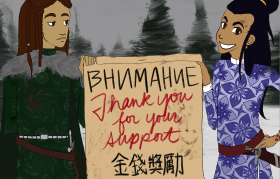
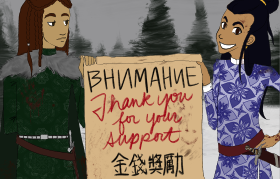
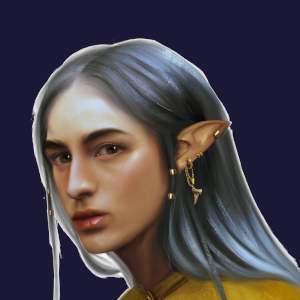
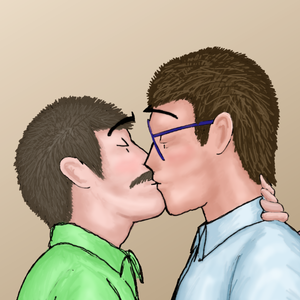







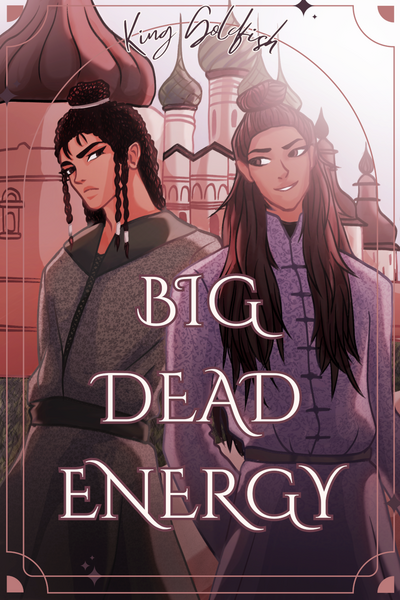
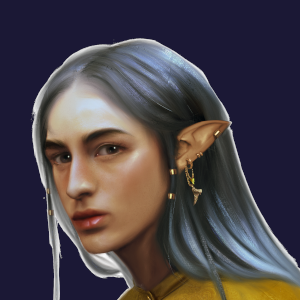
Comments (12)
See all